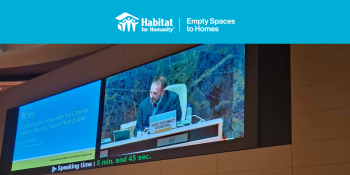
Habitat for Humanity’s Call for EU Housing Reform at the 2023 Forum of Mayors
Europe’s empty buildings an opportunity for change
Last year, Habitat for Humanity International had the opportunity to participate in the United Nations Economic Commission for Europe (UN-ECE) Forum of Mayors in Geneva, Switzerland. This high-level event brought together representatives from 40 national governments, local authorities, and housing and climate experts from across the continent to explore sustainable urban solutions. We joined the forum to present one of our most transformative initiatives—Empty Spaces to Homes—a project that reimagines vacant buildings as a key part of solving Europe’s housing and climate crises.
Across Europe, 30 million buildings sit vacant while nearly 900,000 people experience homelessness each night. This stark contrast reveals both a significant problem and a tremendous opportunity. Habitat for Humanity’s Empty Spaces to Homes project, supported by Laudes Foundation and M&G, is addressing these challenges by transforming vacant buildings into sustainable, affordable housing. Rather than constructing new homes that contribute to environmental harm, the project revitalizes abandoned properties, reducing waste and tackling two urgent issues: the housing crisis and the building sector’s carbon footprint, which accounts for 35% of the EU’s energy-related emissions.
Bringing the vision to life: success in the UK and Poland
The initial phase of this project has already yielded impressive results in the UK and Poland.
In the UK, with generous support from M&G as a main donor, the initiative has expanded beyond just constructing homes. It’s also focused on building partnerships, engaging local communities, and influencing public policy. Since its inception in 2019, by 2023 the UK project had completed critical research, forged key partnerships, and delivered its first housing projects.
In Poland, the focus has been on collaborating with Social Rental Agencies to connect landlords with tenants in need of affordable housing. This model has proven particularly effective in Central and Eastern Europe, where the large-scale privatization of housing in the 1990s reduced the availability of public housing options. These pilot programs are laying the groundwork for broader, long-term change.
Taking the message global
Habitat for Humanity International’s participation at the UN-ECE conference in Geneva offered a unique platform to present the Empty Spaces to Homes initiative to decision-makers from 40 governments, major European cities, and climate and housing experts. These influential figures play key roles in shaping the future of housing policy across Europe. By presenting the project to such an esteemed audience, Gyorgy Sumeghy, representing Habitat for Humanity, amplified the message that Europe’s vacant buildings are not just eyesores—they’re valuable assets capable of addressing two pressing challenges: the housing crisis and climate change.
This presentation provided a powerful platform to advocate for scalable solutions that transform vacant buildings into homes, reduce carbon emissions, and help build more inclusive communities. The conference sparked vital conversations about the policy changes and long-term support needed to scale initiatives like Empty Spaces to Homes. This marked a significant step toward ensuring the project’s impact spans across Europe, shaping national policies and promoting the adoption of similar solutions continent-wide.
A call for policy change
To maximize this impact, Habitat for Humanity is advocating for key policy changes at the EU level, including:
- establishing a clear definition of “vacant real estate” to streamline data collection and decision-making.
- mapping Europe’s vacant properties to pinpoint where housing solutions are most needed.
- launching campaigns to raise awareness about the environmental and social benefits of repurposing empty buildings.
- allocating funding from existing EU programs to support these initiatives.
Changing how we view housing
Empty Spaces to Homes challenges the widely held belief that new construction is the only solution to housing shortages. Instead, it promotes a paradigm shift in how we view vacant buildings—not as problems, but as untapped resources ready for transformation into homes.
The message is clear: Europe’s empty buildings are not liabilities—they’re opportunities. By embracing this vision, we can solve the housing crisis, reduce carbon emissions, and create inclusive, sustainable communities for the future.